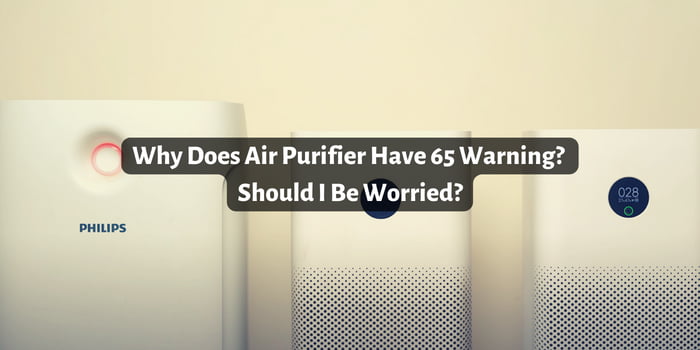Last Updated on August 24, 2025
If you took a look at the box or the manual of air purifiers, you might have noticed that there is a Prop 65 warning. Although this warning is not present in all available devices, most of the air purifiers on the market will come with this warning. But why does air purifier have 65 warnings? What does it mean?
Air purifiers have the Prop 65 warning to comply with the legal requirement of California. If brands and businesses do not provide this warning, they will not be capable of legally making sales in that region. It gives warnings about exposure to chemicals that can cause birth defects, cancer, and other reproductive harm.
So, does that mean you should not use an air purification device with a Prop 65 warning? The case is not that simple. And you can understand it all by going through our in-depth discussion.
Why Do Air Purifiers Have Prop 65 Warning?
To get to the bottom of the topic, you must clearly understand why do air purifiers have a Prop 65 warning. As we have stated earlier, California law states that products that utilize certain chemicals should have a Prop 65 warning. It is a legal requirement, and the law was enacted in 1986.
Some air purifiers will rely on different chemical types to perform purification. Air purifiers without prop 65 warning can not be sold legally. This law is something that air purifier brands have to comply with to make sales in California.
What Does the Prop 65 Warning Mean?
Now that you know why air purification devices come with a Prop 65 warning, let’s discuss what the warning means in detail. California’s Proposition 65, the Safe Drinking Water and Toxic Enforcement Act of 1986, created the “65 Warning” label on many products. This initiative mandates companies to warn customers when their products contain state-designated cancer- and reproductive-harm chemicals.
That said, there are about 900 different chemicals on the Proposition 65 list. The total number constantly changes because new chemicals are added to the list when research shows concrete results. And other types of air purification devices will utilize different types of chemicals from the Prop 65 list.
Chemicals of Concern
Many air purifiers include chemicals that can trigger the “65 Warning.” For instance, some devices utilize ozone generators or photocatalytic oxidation to neutralize pollutants. While effective, these methods can produce ozone or byproducts that are listed under Proposition 65.
Potential Health Impacts
The warning doesn’t necessarily indicate immediate danger. Instead, it serves as a cautionary measure. The chemicals listed under Proposition 65 might pose risks after prolonged and significant exposure. The warning is a reminder to use the product in a well-ventilated space and follow manufacturer instructions.
Manufacturers’ Compliance
Manufacturers often provide the warning to comply with California law, even if the product’s potential exposure is minimal. This practice ensures legal compliance and informs consumers about potential risks.
Steps to Minimize Exposure
To mitigate potential risks, consider placing your air purifier in well-ventilated areas and following usage guidelines. Proper maintenance, regular filter replacement, and selecting air purifiers with lower emission technologies can help minimize exposure.
Balancing Indoor Air Quality
While the warning is essential, it’s also crucial to acknowledge the benefits of air purifiers. They significantly improve indoor air quality, especially in spaces where ventilation is limited and outdoor pollutants easily infiltrate.
Choosing the Right Air Purifier
When selecting an air purifier, look for reputable brands that provide transparent information about their technologies and potential chemical emissions. Opt for devices with HEPA filters or multi-stage filtration systems that are proven to be effective and safe.
Maintenance and Longevity
Regular maintenance is key to ensuring your air purifier functions optimally. Follow the manufacturer’s maintenance recommendations, including filter replacement schedules, to guarantee clean and healthy air over time.
Common Misconceptions
There’s a misconception that the “65 Warning” indicates the air purifier is ineffective or harmful. In reality, it’s more about transparency and informing consumers about potential risks, allowing them to make educated choices.
The Future of Air Purifiers
As technology advances, air purifiers are likely to become even more efficient and environmentally friendly. Manufacturers are actively researching safer alternatives to chemicals that trigger the “65 Warning,” ensuring cleaner air without unnecessary risks.
Final Words
So, why do air purifiers have a Prop 65 warning? It is there to let the users know the potential risks of using the device.
When air purifiers have a Prop 65 warning, it states that the device utilizes one or more chemicals that can cause cancer, birth defects, or other reproductive defects. However, it is not unsafe to use an air purifier without Prop 65 warning.
